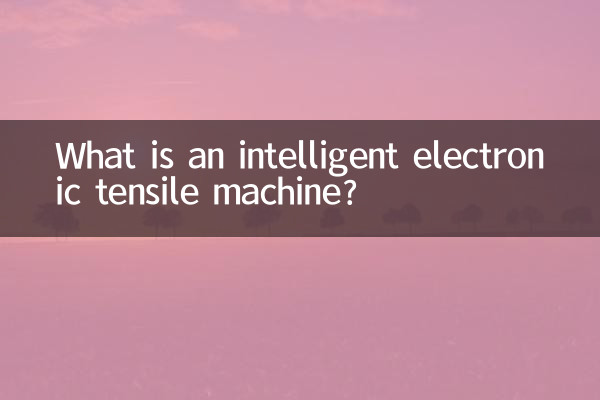What is an intelligent electronic tensile machine?
In today's era of rapid technological development, intelligent electronic tensile machines, as a high-precision material testing equipment, are gradually becoming an important tool in the fields of industrial manufacturing, scientific research experiments and quality inspection. This article will introduce in detail the definition, working principle, application scenarios and comparison of popular models on the market to help readers fully understand this equipment.
1. Definition of intelligent electronic tensile machine

The intelligent electronic tensile machine is a device that tests the mechanical properties of materials such as tension, compression, and bending through an electronic control system. It combines high-precision sensors, computer control and data analysis technology to record test data and generate reports in real time. It is widely used in the performance evaluation of metals, plastics, rubber, textiles and other materials.
| core components | Function description |
|---|---|
| Loading frame | Provide a stable mechanical testing environment to support the tested samples |
| High precision sensor | Real-time measurement of force value changes with an accuracy of ±0.5% |
| control system | Control loading speed and direction via motor or servo system |
| Data acquisition module | Record parameters such as displacement, deformation, force values, etc. |
| software system | Analyze data and generate test reports |
2. Working principle
The working principle of the intelligent electronic tensile machine can be divided into the following steps:
1.Sample installation: Fix the material to be tested on the fixture to ensure neutrality.
2.Parameter settings: Set the test speed, loading method, etc. through the control panel or software.
3.test execution: The equipment applies force according to the set program and records the displacement and force data at the same time.
4.data analysis: The software automatically calculates elastic modulus, tensile strength, elongation at break and other indicators.
5.Report generation: Output a standardized report containing curve graphs and data tables.
| Test type | Applicable materials | Typical standards |
|---|---|---|
| Tensile test | metal, plastic, rubber | ASTM E8, ISO 6892 |
| Compression test | Foam, composite materials | ASTM D575, ISO 844 |
| Bend test | Plates, pipes | ASTM D790, ISO 178 |
| Shear test | Adhesives, fabrics | ASTM D732, ISO 1922 |
3. Application fields
1.Manufacturing: Used for raw material incoming factory inspection and product quality control.
2.Scientific research institutions: Research on mechanical properties of new materials, product development and testing.
3.Quality inspection department: Carry out national mandatory standard testing and issue certification reports.
4.Education field: University laboratories are used for material mechanics teaching experiments.
4. Comparison of popular models
According to data from e-commerce platforms and industry media in the past 10 days, the following is a comparison of popular smart electronic tensile machine models:
| Model | Maximum load | Accuracy | price range | Main features |
|---|---|---|---|---|
| Instron 3365 | 5kN | ±0.5% | 150,000-200,000 | Bluehill software, versatile testing |
| MTS C42.503 | 10kN | ±0.25% | 180,000-250,000 | High-speed data acquisition, military grade |
| Zwick Roell Z010 | 10kN | ±0.5% | 120,000-160,000 | Modular design, easy to operate |
| Shimadzu AGS-X | 20kN | ±0.3% | 200,000-280,000 | Automatic centering system, high rigidity |
| Domestic TSE104B | 5 kN | ±1% | 30,000-50,000 | Economical type, basic testing needs |
5. Technology development trends
1.Intelligent upgrade: Integrated AI algorithm to achieve automatic fault diagnosis and test optimization.
2.IoT integration: Support remote monitoring and data cloud storage.
3.Green energy saving: Use high-efficiency motors to reduce energy consumption.
4.Multi-language support: Meet the needs of the global market.
Conclusion
As the core equipment for modern materials testing, the intelligent electronic tensile machine's technological development and application scope are constantly expanding. With the advancement of the Made in China 2025 strategy, the advantages of domestic equipment in terms of cost performance and service response have become increasingly prominent. Choosing a suitable electronic tensile machine requires comprehensive consideration of testing needs, budget, and long-term development. It is recommended that users conduct a detailed evaluation based on actual application scenarios.

check the details

check the details